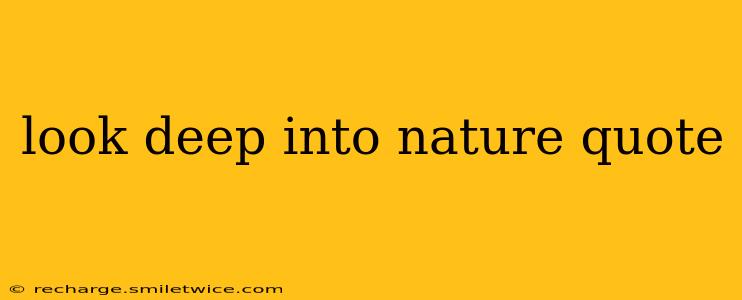Albert Einstein's quote, "Look deep into nature, and then you will understand everything better," is a powerful statement that resonates far beyond its simple wording. It's a call to observe, to learn, and to find profound wisdom within the natural world. But what does it truly mean, and how can we apply this insightful philosophy to our lives? This exploration will delve into the meaning of this famous quote, examining its implications for scientific understanding, personal growth, and our relationship with the planet.
What Did Einstein Mean by "Look Deep Into Nature"?
Einstein wasn't simply suggesting a casual glance at a flower or a stroll in the park. His "look deep" implies a profound and contemplative observation, a willingness to engage with the intricate details and interconnectedness of the natural world. This involves:
- Careful Observation: Paying close attention to the details, patterns, and processes within nature. This might involve studying the intricate veins of a leaf, the intricate dance of bees pollinating flowers, or the cyclical patterns of the tides.
- Critical Thinking: Moving beyond simple observation to analyze and interpret what's been observed. Seeking underlying principles, connections, and explanations for natural phenomena.
- Understanding Interconnectedness: Recognizing that everything in nature is interconnected. A change in one part of the ecosystem can have ripple effects throughout the entire system.
How Does Nature Help Us Understand "Everything Better"?
Einstein's assertion that understanding nature leads to a better understanding of "everything" is ambitious, but it holds merit. Nature provides models and analogies that can illuminate diverse fields:
- Scientific Discovery: Many scientific breakthroughs have been inspired by observations of nature. The design of airplanes, for example, is directly inspired by the aerodynamics of birds. The study of biological systems has advanced our understanding of complex systems in general.
- Problem-Solving: Nature's solutions to problems – like efficient energy transfer in plants or the resilience of ecosystems – can inspire creative solutions to human challenges. Biomimicry, the practice of emulating nature's designs, is a testament to this.
- Personal Growth: Spending time in nature has been shown to reduce stress, improve mental clarity, and foster a sense of awe and wonder. This can lead to a deeper understanding of ourselves and our place in the world.
What are the benefits of spending time in nature?
Studies consistently demonstrate the positive effects of nature on mental and physical health. Exposure to natural environments has been linked to:
- Reduced Stress and Anxiety: The sights, sounds, and smells of nature have a calming effect on the nervous system.
- Improved Mood and Cognitive Function: Time spent outdoors can boost creativity and focus.
- Increased Physical Activity: Nature provides opportunities for physical activity, promoting overall well-being.
- Enhanced Creativity and Problem-Solving: Exposure to natural environments can stimulate creative thinking.
How can I look deeper into nature?
Simply observing nature passively isn't enough; active engagement is key. Here are some suggestions:
- Mindful Observation: Practice mindfulness while in nature, paying close attention to your senses and the details around you.
- Photography or Sketching: Document your observations visually, encouraging closer scrutiny of details.
- Learning About Nature: Read books, watch documentaries, or take courses to expand your understanding of natural processes.
- Participate in Citizen Science: Contribute to scientific research by participating in data collection projects related to nature.
What is the importance of understanding nature's interconnectedness?
Understanding that all things in nature are interconnected fosters a sense of responsibility and stewardship. It highlights the importance of sustainable practices and protecting the environment. Without this interconnectedness, we risk damaging the very systems that support human life.
In conclusion, Einstein's profound statement encourages a deeper, more meaningful engagement with the natural world. By looking deep into nature, we don't just gain scientific knowledge; we also foster personal growth, cultivate a sense of wonder, and develop a greater understanding of our place within the intricate web of life. It's a call to observe, reflect, and learn – a journey of discovery that can lead to a richer and more meaningful life.
